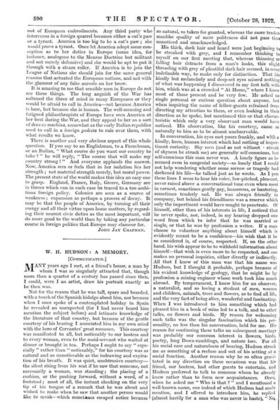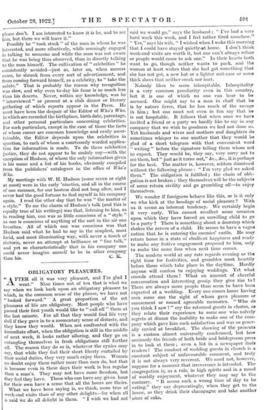M ANY years ago I met, at a friend's house, a
man by whom I was so singularly attracted that, though more than a quarter of a century has passed since then, I could, were I an artist, draw his portrait exactly as he then was.
Not for the reason that he was tall, spare and bearded, with a touch of the Spanish hidalgo about him, nor because when I once spoke of a contemplated holiday in Spain he revealed an unexpected (for I had never heard him mention the subject before) and intimate knowledge of the literature of that country, but because of the gentle courtesy of his bearing I associated him in my own mind with the hero of Cervantes' great romance. This courtesy was manifested to all, but noticeably to our hostess and to every woman, even to the maid-servant who waited at dinner or brought in tea. Perhaps I ought to say " espe- cially " rather than " noticeably," for his courtesy was as natural and as unnoticeable as the indrawing and expira- tion of his breath. It was quiet, unobtrusive courtesy— the silent rising from his seat if he saw that someone, not necessarily a woman, was standing ; the placing of a cushion, or the pushing forward, without a word, of a footstool ; most of all, the instant checking on the very tip of his tongue of a remark that he was about and wished to make when he saw that another person would like to speak—which sometimes escaped notice because so natural, so taken for granted, whereas the snore trades. manlike quality of mere politeness did not pass thus unnoticed and unacknowledged.
His thick, dark hair and beard were just beginning to be streaked with grey, and I remember thinking to myself on our first meeting that, whereas thinning or falling hair detracts from a man's looks, this slight threading with grey of plentiful dark hair seemed, in some indefinable way, to make only for distinction. That his kindly but melancholy and deep-set eyes missed nothing of what was happening I discovered in my first talk with him, which was at a crowded " At Home," where I knew most of those present and he very few. He asked no single personal or curious question about anyone, but when inquiring the name of fellow-guests refrained from directing my attention to them, or even looking in their direction as he spoke, but mentioned this or that charae. teristic which only a very observant man would have noticed. His observation, like his courtesy, came so naturally to him as to be almost unobservable.
In conversation, his eyes met yours frankly, and with a kindly, keen, human interest which had nothing of imper- tinent curiosity. Shy men (and as not without streak of shyness he struck me) are generally self-conscious, but self-conscious this man never was. A lonely figure as he seemed even in congenial society—so lonely that I could not help wondering whether some sorrow or tragedy had darkened his life—Ire talked just as he wrote. As I pen these lines I seem to hear his voice, low-pitched, pleasant, never raised above a conversational tone even when most in earnest, sometimes gently gay, humorous, or bantering, sometimes tenderly sad. He was always friendly in company, but behind his friendliness was a reserve which only the impertinent would have sought to penetrate. Of himself, other than of his interests in life, I noticed that he never spoke, nor, indeed, in my hearing dropped one word from which to infer that he was married or single, or that he was by profession a writer. If a man choose to volunteer anything about himself which is evidently meant to be a confidence—his wish that it be so considered is, of course, respected. If, on the other hand, his wish appear to be to withhold information about himself—that wish is even more to be respected, and one makes no personal inquiries, either directly or imlirectly. All that I knew of this man was that his name was Hudson, but I thought it probable, perhaps because of his evident knowledge of geology, that he might be by profession a mining engineer whose work took him much abroad. By temperament, I knew him for an observer, a naturalist, and so loving a student of men, women and children, animals, trees and flowers, as to find all life, and the very fact of being alive, wonderful and fascinating. When I was introduced to him something which had pleased him in a book of mine led to a talk, and to other talks, on flowers and birds. My reason for welcoming such talks was the singular fascination which his per- sonality, no less than his conversation, held for me. His reason for continuing these talks, on subsequent meetings was probably our common interest in flowers, birds, poetry, long Down-ramblings, and nature lore. For all his social ease and naturalness of bearing, Hudson struck me as something of a recluse and out of his setting at a social function. Another reason why he so often gravi- tated in my direction on these occasions was that his friend, our hostess, had other guests to entertain, and Hudson preferred to talk to someone whom he already knew rather than to form new acquaintances. Once, when he asked me " Who is that ? " and I mentioned a well-known name, one indeed of which Hudson had made mention, and I offered to introduce him, he replied (almost hastily for a man who was never in haste), " please don't. I am interested to know it is he, and to see him, but there we will leave it."
Possibly he " took stock " of the man in whom he was interested, and more effectively, while seemingly engaged in talking to someone and while the man was not aware that he was being thus observed, than in directly talking to the man himself. The cultivation of " celebrities " he consistently avoided—just as, later on, when success came, he shrank from every sort of advertisement, and from coming forward himself, as a celebrity, to " take the salute." That is probably the reason why recognition was slow, and why even to-day his fame is so much less than his deserts. Never, within my knowledge, was he " interviewed " or present at . a club dinner or literary gathering of which reports appear in the Press. He must have been the despair of the Editor of Who's Who, in which are recorded the birthplace, birth date, parentage, and other personal particulars concerning celebrities. For such particulars, except in the case of those the facts of whose career are common knowledge and easily ascer- tainable, the Editor depends upon the celebrities in question, to each of whom a courteously worded applica- tion for information is made. To do these celebrities justice, they do not appear to be unduly coy—with the exception of Hudson, of whom the only information given is his name and a list of his books, obviously compiled from the publishers' catalogues in the office of Who's Who.
My meetings with W. II. Hudson (some seven or eight at most) were in the early 'nineties, and all in the course of one summer, for our hostess died not long after, and I never had the good fortune to find myself in his company again. I read the other day that he was " the master of a style." To me the charm of Hudson's talk (and this is equally true of his writings) was that, listening to him, as in reading him, one was as little conscious of a " style " as one is conscious of anything of the sort in the air one breathes. All of which one was conscious was that Hudson said what he had to say in the simplest, most lucid, and most illuminating way, with never a touch of rhetoric, never an attempt at brilliance or " fine talk," and yet so characteristically that in his company one could never imagine oneself to be in other company











































 Previous page
Previous page